|
|
|
Sort Order |
|
|
|
Items / Page
|
|
|
|
|
|
|
| Srl | Item |
| 1 |
ID:
087465


|
|
|
|
|
| Publication |
2009.
|
| Summary/Abstract |
Poaching of tigers is a major threat to the survival of the species. China is responsible for much of the demand for tiger parts. Poaching occurs because it is profitable and organizations able to procure transport and sell tiger products over thousands of miles and international borders also exist. Unfortunately there is little corresponding data on these organizations. It appears as if these organizations operate to minimize the most significant transaction cost along the supply chain. Tigers are a minority element in a portfolio of wildlife products assembled by smugglers in range states. Within China smugglers specialize in the skins and bones of tigers, and are most likely to operate in small, discrete groups. This is a function of the high coordination and evasion costs of operating in China. The demand for tiger parts has strong cultural and medicinal influences.
|
|
|
|
|
|
|
|
|
|
|
|
|
|
|
|
| 2 |
ID:
149905


|
|
|
|
|
| Summary/Abstract |
The UK market for energy service contracts is expanding, owing in part to the emergence of intermediaries for those contracts in different parts of the public sector. These intermediaries combine a legal framework for establishing contracts with an organisational framework that facilitates contract negotiation and execution. This paper examines the nature and operation of these intermediaries in more detail, including their achievements to date and their similarities and differences. It uses ideas from transaction cost economics to develop a theoretical model of the contracting decision and shows how intermediary organisations can lower the transaction costs incurred by both clients and contractors, thereby increasing the viability of contracting. The paper argues that intermediaries can play an important role in expanding the market for energy service contracts, and hence in delivering cost-effective energy efficiency improvements throughout the public sector.
|
|
|
|
|
|
|
|
|
|
|
|
|
|
|
|
| 3 |
ID:
113719
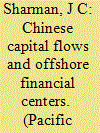

|
|
|
|
|
| Publication |
2012.
|
| Summary/Abstract |
Why is the British Virgin Islands a bigger source of foreign direct investment into China than the USA, the European Union and Japan combined? Why is there 10 times more investment from China in the Caymans Islands than there is in the USA? This paper argues that these flows represent the efforts of Chinese and foreign investors to reduce governance and measurement transaction costs. Investors avail themselves of efficient institutions in offshore centers that are absent locally. These institutional attractions include the ease of raising capital on foreign stock markets, access to reliable courts, and more flexible and sophisticated financial products. Existing explanations of these capital movements, characterizing them as criminal money or tax arbitrage, are insufficient. Evidence is drawn from government statistics, private legal advice and interviews in offshore financial centers.
|
|
|
|
|
|
|
|
|
|
|
|
|
|
|
|
| 4 |
ID:
072444


|
|
|
| 5 |
ID:
159035


|
|
|
|
|
| Summary/Abstract |
Since 1984, the foreign debt of the Peoples' Republic of China has increased at a greater rate than would be explained by changes in the country's current account, foreign direct investment and reserve holdings. This pattern is consistent with large-scale outflow of financial capital, commonly referred to as capital flight. Since 2005, capital flight has accelerated reaching $425 billion (plus or minus $60 billion) in 2014 alone. This study provides three estimates for capital flight from China for the period 1984 through 2014 using both Cuddington's balance of payments and more inclusive residual measures. These measures are adjusted to reflect the legitimate assets of the Chinese banking industry, mis-invoicing of China's trade with its major trading partners (especially Hong Kong), exchange rate changes, and the failure of official debt data to capture certain bank transactions. Based on these estimates, it is concluded that capital controls have little long-term effect on the volume of capital flight, Hong Kong is increasingly a pipeline for capital flight from the mainland, and that ‘traditional’ explanations do not apply to China's capital flight over the last decade. Finally, corruption, transaction costs, and facilitating migration are considered as possible explanations of the recent acceleration of Chinese capital flight.
|
|
|
|
|
|
|
|
|
|
|
|
|
|
|
|
| 6 |
ID:
100284
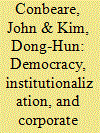

|
|
|
|
|
| Publication |
2010.
|
| Summary/Abstract |
The authors bring together and extend three strands of existing research: the propensity of democracies to ally with each other, the effects of alliances being institutionalized, and the causal impact of democracy in promoting investment. This literature is applied to corporate alliances, predicting the probability that announced alliance contracts will be completed by the participants. The authors find that democratic political regimes generate rules that create corporate shareholder democracy and that the latter promotes the institutionalization of corporate alliances. Corporate democracy and alliance institutionalization will both, controlling for transaction costs, increase the probability that corporate alliances will be completed. The findings suggest a positive association among democratic corporate governance, the willingness of corporate alliance partners to accept institutionalized ties, and the creation of an environment conducive to commercial investment commitments through alliances. Overall, corporations appear to respond to some of the same alliance incentives as sovereign states.
|
|
|
|
|
|
|
|
|
|
|
|
|
|
|
|
| 7 |
ID:
150990


|
|
|
|
|
| Summary/Abstract |
This study compared the effects of three interventions and a no-intervention control on the settlement of resource and value conflicts. These variables were arranged in a two (conflict issue: resources vs. values) by four (no intervention vs. other affirmation vs. shared identity vs. transaction costs) between-dyads design in which 127 dyads engaged in a negotiation task. Negotiators reached generally lower joint outcomes in the value conflict compared to the resource conflict, but after the other-affirmation intervention, this pattern was reversed. The shared-identity intervention did not result in higher joint outcomes for value conflicts. Stressing positive concern for the other negotiator may be a more effective strategy than stressing commonalities between the parties: increased concern for self and decreased defense of own opinions may account for this result. Forcing and logrolling behavior are shown to be mediating variables between the type of conflict and outcomes.
|
|
|
|
|
|
|
|
|
|
|
|
|
|
|
|
| 8 |
ID:
122460


|
|
|
|
|
| Publication |
2013.
|
| Summary/Abstract |
The purpose of this article is to examine the relationships between real estate market factors (transaction costs, landlord and tenant practices and property rights) and foreign real estate investments (FREI) after controlling for other relevant determinants of FREI. This article uses related observations from 38 countries to investigate the relationships between real estate market factors and FREI. Our analysis shows that countries with lower transaction costs and higher level of property rights attract greater amounts of FREI. Furthermore, our empirical results indicate that there is a positive and significant relationship between pro-landlord practices and FREI.
|
|
|
|
|
|
|
|
|
|
|
|
|
|
|
|
| 9 |
ID:
150830
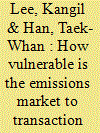

|
|
|
|
|
| Summary/Abstract |
The impact of transaction costs on the early emissions trading market is examined by applying an agent-based model and simulation (ABMS) approach. For a realistic model set up, bounded rationality, stochastic characteristics, and learning-by-doing are considered in our search processes. Marginal abatement cost parameters are obtained from Yoo et al. (2010), which is an experimental study on the emissions trading in the Korean power sector. Sensitivity analyses are performed on market performance indices with regard to transaction cost parameters, which represent scales and the learning elasticities of transaction costs. A total of 960 simulations were run in this sensitivity analysis. Sensitivity analysis results consistently show that higher transaction costs worsen market performance. The most remarkable finding in these results is that welfare performance of all the transactions decreases by up to 50% as the scale parameters of transaction costs increase, implying that welfare gain from introducing emissions trading disappears significantly. However, with learning curve effect, welfare performance could be regained by up to 26%. In sum, although transaction costs significantly encroach upon trade gains at the early stage, based on our simulation results, the welfare loss by way of transaction costs is lessened as the knowledge of market participants progresses.
|
|
|
|
|
|
|
|
|
|
|
|
|
|
|
|
| 10 |
ID:
114324


|
|
|
|
|
| Publication |
2012.
|
| Summary/Abstract |
Emission trading is considered to be a cost-effective environmental economic instrument for pollution control. However, the policy design of an emission trading program has a decisive impact on its performance. Allowance allocation is one of the most important policy design issues in emission trading, not only for equity but also for policy performance. In this research, an artificial market for sulfur dioxide (SO2) emission trading was constructed by applying an agent-based model. The performance of the Jiangsu SO2 emission trading market was examined under different allowance allocation methods and transaction costs. The results showed that the market efficiency of emission trading would be affected by the allocation methods when the transaction costs are positive. The auction allowance allocation method was more efficient and had the lowest total emission control costs than the other three allocation methods examined. However, the use of this method will require that power plants pay for all of their allowance, and doing so will increase the production costs of power plants. On the other hand, output-based allowance allocation is the second best method.
|
|
|
|
|
|
|
|
|
|
|
|
|
|
|
|
| 11 |
ID:
062334


|
|
|
| 12 |
ID:
187801


|
|
|
|
|
| Summary/Abstract |
The problem of high savings and low consumption of Chinese rural households has long been a source of concern. The popularity of mobile payments may help alleviate this problem. This paper examines the impact of mobile payments on household consumption in rural China by using data from the China Household Finance Survey (CHFS). To overcome the potential endogeneity, we use the instrumental variable (IV) and difference-in-differences (DID) methods and find a significant positive effect of mobile payments on rural household consumption. Mechanism analysis indicates that the positive impact of mobile payments is partially explained by the reduction in transaction costs, the easing of liquidity constraints, and the decrease in mental accounting loss. Furthermore, we verify the inclusive function of mobile payments through heterogeneity analysis and find that they play a greater role in promoting rural household consumption, especially for socially vulnerable groups, such as the elderly, people on low incomes, and low education. Our findings contribute to the literature on consumer finance and inclusive finance and have important implications for other countries.
|
|
|
|
|
|
|
|
|
|
|
|
|
|
|
|
| 13 |
ID:
125112


|
|
|
|
|
| Publication |
2013.
|
| Summary/Abstract |
Using a simulated bilateral negotiation over several security issues, the authors explore how variations in the negotiation context influence reactions to a negotiating crisis. Negotiators were primed to focus on one of three aspects of the context: transaction costs, dependence, or shared identity. They were asked to respond to the crisis with a decision to reach an immediate agreement, continue negotiating, or reframe the issues. The results showed that mutual dependence (unattractive alternatives) led to reframing (turning points) whereas high transaction costs led to a preference for continuing the negotiation. Shared identity did not affect negotiators preference across alternative courses of action. Affective trust amplified the impact of dependence and transaction costs: the decision to reframe was made more often by negotiators who reported low affective trust, whereas the decision to reach immediate agreement was made more often by negotiators who reported high affective trust. High cognitive trust encouraged negotiators to continue the negotiation if they had a shared identity or if transaction costs were high. Applications were made to real-world cases and implications were developed for Relational Order theory and for further research.
|
|
|
|
|
|
|
|
|
|
|
|
|
|
|
|
| 14 |
ID:
075511


|
|
|
| 15 |
ID:
122794


|
|
|
|
|
| Publication |
2013.
|
| Summary/Abstract |
What does it cost to do business under a dictator? In 1949 the Soviet state had entered its most secretive phase. One of the Gulag's most important secrets was the location of its labour camps. As this secret was guarded more closely, camps found it increasingly difficult to do business without disclosing a state secret: their own location. For months and then years Gulag officials worked around this dilemma, expending considerable efforts. Rather than resolve it, they eventually normalised it. This study of the transaction costs of an autocratic regime raises basic questions about how Soviet secrecy was calibrated.
|
|
|
|
|
|
|
|
|
|
|
|
|
|
|
|
| 16 |
ID:
077190
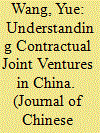

|
|
|
|
|
| Publication |
2007.
|
| Summary/Abstract |
Contractual Joint Ventures (CJVs) in China have been under-studied despite their importance as one of the three major forms of foreign direct investment (FDI) prescribed by the Chinese government. Based on first-hand survey data and within a transaction cost-comparative institution framework, the paper conceptualizes the nature of CJVs as a relational subcontracting arrangement rather than a form of FDI. Formed mainly between Hong Kong and Chinese manufacturing firms in the South China province of Guangdong, CJVs display quasi-market and quasi-hierarchy features, sitting between Processing and Assembling arrangements (P&As) on the one hand and Equity Joint Ventures (EIVs) and Wholly Foreign Owned Enterprises (WFOEs) on the other. The theoretical and practical implications are discussed.
|
|
|
|
|
|
|
|
|
|
|
|
|
|
|
|
| 17 |
ID:
108920
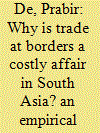

|
|
|
|
|
| Publication |
2011.
|
| Summary/Abstract |
Through the agreement on the South Asian Free Trade Area (SAFTA), South Asian countries are now looking towards deeper integration of the region. Nevertheless, South Asia is far from realising its full potential. The econometric evidence provided in this article strengthens the existing linkage of trade costs, transit and trade flows; the higher the transaction costs between each pair of trade partners, the less they trade. The analysis given in this article shows that improved trade facilitation would enhance regional trade very much the same way tariff liberalisation does. This article also suggests that an important means of promoting regional trade could be improved trade facilitation, which will not only enhance regional trade but will also strengthen the trade capacity of the landlocked countries.
|
|
|
|
|
|
|
|
|
|
|
|
|
|
|
|
| 18 |
ID:
177160


|
|
|
|
|
| Summary/Abstract |
Transaction costs have a negative impact on the implementation and effectiveness of energy efficiency policies, while they remain rarely systematically tracked and evaluated. Transaction costs should decrease over time, thanks to the ageing of the policy (and the effects of learning) and the prevalence of initial, fixed costs. However, we find that the opposite may be true.
|
|
|
|
|
|
|
|
|
|
|
|
|
|
|
|
|
|
|
|
|